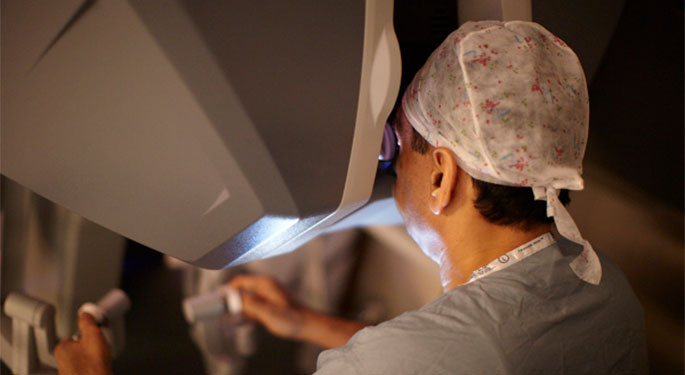Robotics for Prostate Cancer Surgery

Our surgical robotics system is a state-of-the-art technology and consists of two primary components: the surgeons viewing and control console and the surgical arm units that position and maneuver detachable and interchangeable surgical instruments.
These pencil-sized instruments, with computer-enhanced mechanical wrists, provide the dexterity of the surgeon's forearm and wrist at the operative site through tiny incisions of less than one centimeter. This range of motion is greater than the human wrist.
The magnified, three-dimensional view enables our surgeons to see anatomical structures in high definition and natural colors with up to 10-times magnification and perform precise surgery in complex procedures through small surgical incisions. This is especially important with robotic prostate surgery, where the operative field is difficult to reach.
Our surgical robotics system cannot be programmed or make decisions on its own. Our surgeons perform every surgical maneuver. The system has been successfully used in thousands of prostate cancer surgery procedures worldwide.
This procedure is not for everyone. We will guide you about your individual suitability for robotic prostate surgery.
Your Doctor Visit
During your initial prostate cancer evaluation visit, you will be examined by members of our clinical team, who will also review your medical records. We will assess whether you are a good candidate for a robotic assisted laparoscopic radical prostatectomy (RALP) or ART robotic prostate surgery. We will also discuss the treatment options we are offering, and any concerns or questions you may have.
If you are a suitable robotic prostate cancer surgery candidate and you wish to schedule the procedure, we can start that process right after the evaluation.
Once we schedule the procedure, we will email you information that addresses many of the questions you might have, including all necessary instructions. We can also provide the information in printed form. We have a dedicated team of medical and support staff who are committed to helping you prepare for the procedure.
“Overdiagnosis and treatment are the two biggest challenges urologists face with respect to prostate cancer and providing men with appropriate care,” says Department Chair Ashutosh Tewari, MBBS, MCh, FRCS (Hon.), DSc (Hon.). “Fortunately, Mount Sinai is able to offer patients fusion biopsies which is helping us to identify those men whose cancer is not high risk.”